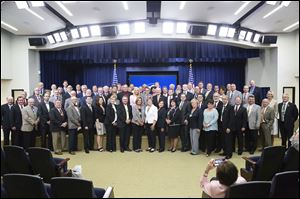
LUCAS CO. COMMISSIONERS ABSENT
80 Ohio officials get info at D.C. meetings
8/29/2017

Kellyanne Conway, senior counselor to the President, takes a group photo with about 80 Ohio county commissioners during a meeting at the Eisenhower Executive Office. Lucas County’s commissioners did not go Tuesday.
WASHINGTON – While the President was in storm-ravaged Texas to highlight the intensity of local and federal relief efforts, one of his chief deputies was calling on officials at all levels of government to approach the opioid crisis with the same vigor and coordination.
Kellyanne Conway delivered her message to 80 Ohio county commissioners who were invited to the White House for a series of discussions and meetings with cabinet secretaries and White House liaisons working on a variety of issues affecting the state including tax relief, agriculture policy, nuclear energy, and algal blooms.
Notable by their absence were Lucas County commissioners Carol Contrada, Pete Gerken, and Tina Skeldon Wozniak, who declined the invitation from the Trump Administration. All three commissioners are Democrats.
Mr. Gerken, president of the county board, earlier said the meeting is not a priority and the timing interferes with the commissioners’ normal meeting day on Tuesday.
“I think we can make better use of taxpayers’ money by staying in Lucas County and working on our core issues of criminal justice reform, balancing our budget, water quality in Lake Erie, and building a new county correctional facility,” he said on Monday.
Commissioners from Ottawa and Wood counties were among the attendees for a full day of mostly private meetings.
Three Ohio reporters, including one from The Blade, were allowed to observe only Ms. Conway’s remarks, which centered on opioid addiction. Ohio has one of the highest rates of opioid-related deaths in the country.
The Hurricane Harvey response exemplifies the kind of governmental cooperation and “neighbor-to-neighbor, good-Samaritan-to-good-Samaritan, and stranger-to-stranger” outreach that is also needed to address the opioid crisis, Ms. Conway told commissioners. “This opioid crisis is … a nonpartisan issue starving for bipartisan attention and solutions.”
She said President Trump is prioritizing the opioid crisis by declaring it a national emergency, by setting up a commission and by pledging resources, but county commissioners must help too.
“We’re going to have to rely on those who are closest to the people in need,” Ms. Conway told commissioners, many of whom snapped cell phone photos of her during her remarks in an auditorium of the Eisenhower Executive Office building adjacent to the White House.
The aim of Tuesday’s event was to open lines of communication between counties and federal agencies.
“I know that these are very politically charged times, but we as a White House very much appreciate you coming here to tell us what’s going on in your state, your counties, your regions, and how we can be able to help you more, and certainly how you think we can be a better partner,’’she told the mostly Republican group.
Wood County commission president Doris Herringshaw and Ottawa County commissioner Mark Stahl, both Republicans, said they were encouraged by a discussion with Agriculture Secretary Sonny Perdue, who addressed concerns about algal blooms in Lake Erie.
In afternoon interviews on the White House grounds, both said they were looking forward to a discussion later with officials from the Department of Energy about Ohio’s contributions to the country’s energy portfolio.
“Ohio is a net importer of electricity, but yet we’re closing coal plants and Davis-Besse nuclear power station could go into decommission,” Mr. Stahl said. “I think that, as a region, there’s room for everything.”
Wood County Commissioner Craig LaHote weighed in on Davis-Besse.
“They understand what the impact is of closing a facility like that, and that it’s pretty much an irreversible situation once it happens. They’re working on some policies that will help. The question is whether it will happen in time for Davis-Besse,” Mr. LaHote said.
Ms. Herringshaw was simply looking for clarity.
“We’d just like to know what the policy is,” she said.
She and Mr. Stahl said Tuesday’s meetings laid the groundwork for better communication with federal agencies in the future.
“They needed to hear things from us. Sometimes we think that Washington, D.C. is a step away from where the county is, and now they know some of our concerns,” she said. “The other thing is that we made a connection with a variety of people that we’ll feel more comfortable picking up the phone and calling.”
Mr. LaHote said there was give and take during the sessions, and that White House officials handled the issues with a bipartisan approach.
“I have to believe there’s at least something we all brought away from this that will help in the future,” Mr. LaHote said. For him, he’ll take away “a better appreciation of who’s involved and what some of the programs are” along with solid contacts that “certainly help as opposed to just going to a website and finding a number to call out of the blue.”
Mr. Stahl said, “It’s our hope that they’ll follow up and continue to work to solve the problems that we have brought down here today. … I’m very hopeful.”
Wood County Commissioner Theodore Bowlus also attended.
Tuesday was the third in a series of similar events with local government officials from other states. More are expected.
The Block News Alliance consists of The Blade and the Pittsburgh Post-Gazette. Tracie Mauriello is Washington bureau chief for the Post-Gazette.